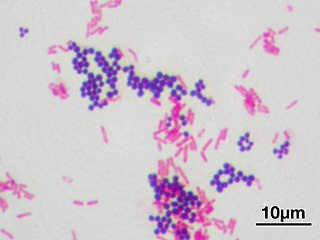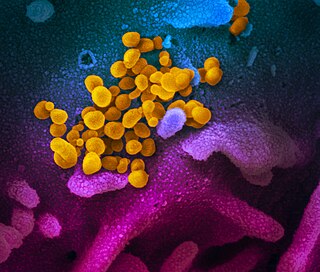
A prion is a misfolded protein that induces misfolding in normal variants of the same protein, leading to cellular death. Prions are responsible for prion diseases, known as transmissible spongiform encephalopathy (TSEs), which are fatal and transmissible neurodegenerative diseases affecting both humans and animals. These proteins can misfold sporadically, due to genetic mutations, or by exposure to an already misfolded protein, leading to an abnormal three-dimensional structure that can propagate misfolding in other proteins.

An infection is the invasion of tissues by pathogens, their multiplication, and the reaction of host tissues to the infectious agent and the toxins they produce. An infectious disease, also known as a transmissible disease or communicable disease, is an illness resulting from an infection.

Infectious mononucleosis, also known as glandular fever, is an infection usually caused by the Epstein–Barr virus (EBV). Most people are infected by the virus as children, when the disease produces few or no symptoms. In young adults, the disease often results in fever, sore throat, enlarged lymph nodes in the neck, and fatigue. Most people recover in two to four weeks; however, feeling tired may last for months. The liver or spleen may also become swollen, and in less than one percent of cases splenic rupture may occur.
Tropical diseases are diseases that are prevalent in or unique to tropical and subtropical regions. The diseases are less prevalent in temperate climates, due in part to the occurrence of a cold season, which controls the insect population by forcing hibernation. However, many were present in northern Europe and northern America in the 17th and 18th centuries before modern understanding of disease causation. The initial impetus for tropical medicine was to protect the health of colonial settlers, notably in India under the British Raj. Insects such as mosquitoes and flies are by far the most common disease carrier, or vector. These insects may carry a parasite, bacterium or virus that is infectious to humans and animals. Most often disease is transmitted by an insect bite, which causes transmission of the infectious agent through subcutaneous blood exchange. Vaccines are not available for most of the diseases listed here, and many do not have cures.
The National Institute of Allergy and Infectious Diseases is one of the 27 institutes and centers that make up the National Institutes of Health (NIH), an agency of the United States Department of Health and Human Services (HHS). NIAID's mission is to conduct basic and applied research to better understand, treat, and prevent infectious, immunologic, and allergic diseases.
A contagious disease is an infectious disease that can be spread rapidly in several ways, including direct contact, indirect contact, and Droplet contact.
Infectious salmon anemia (ISA) is a viral disease of Atlantic salmon caused by Salmon isavirus. It affects fish farms in Canada, Norway, Scotland and Chile, causing severe losses to infected farms. ISA has been a World Organisation for Animal Health notifiable disease since 1990. In the EU, it is classified as a non-exotic disease, and is monitored by the European Community Reference Laboratory for Fish Diseases.

Michael Thomas Osterholm is an American epidemiologist, Regents Professor at the University of Minnesota School of Public Health, and director of the Center for Infectious Disease Research and Policy at the University of Minnesota.

The Infectious Diseases Society of America (IDSA) is a medical association representing physicians, scientists, and other healthcare professionals who specialize in infectious diseases. It was founded in 1963 and is based in Arlington, Virginia. As of 2018, IDSA had more than 11,000 members from across the United States and nearly 100 other countries on six different continents. IDSA's purpose is to improve the health of individuals, communities, and society by promoting excellence in patient care, education, research, public health, and prevention relating to infectious diseases. It is a 501(c)(6) organization.
Clinical Infectious Diseases is a peer-reviewed medical journal published by Oxford University Press covering research on the pathogenesis, clinical investigation, medical microbiology, diagnosis, immune mechanisms, and treatment of diseases caused by infectious agents. It includes articles on antimicrobial resistance, bioterrorism, emerging infections, food safety, hospital epidemiology, and HIV/AIDS. It also features highly focused brief reports, review articles, editorials, commentaries, and supplements. The journal is published on behalf of the Infectious Diseases Society of America. The editor-in-chief is infectious disease physician Paul Sax.

The Vaccine Research Center (VRC), is an intramural division of the National Institute of Allergy and Infectious Diseases (NIAID), part of the National Institutes of Health (NIH), US Department of Health and Human Services (HHS). The mission of the VRC is to discover and develop both vaccines and antibody-based products that target infectious diseases.
The Center for Infectious Disease Research and Policy (CIDRAP) is a center within the University of Minnesota that focuses on addressing public health preparedness and emerging infectious disease response. It was founded in 2001 by Dr. Michael Osterholm, in order to "prevent illness and death from infectious diseases through epidemiological research and rapid translation of scientific information into real-world practical applications and solutions". It is not part of the Center for Disease Control or National Institute of Health.

Infectious diseases (ID), also known as infectiology, is a medical specialty dealing with the diagnosis and treatment of infections. An infectious diseases specialist's practice consists of managing nosocomial (healthcare-acquired) infections or community-acquired infections. An ID specialist investigates and determines the cause of a disease. Once the cause is known, an ID specialist can then run various tests to determine the best drug to treat the disease. While infectious diseases have always been around, the infectious disease specialty did not exist until the late 1900s after scientists and physicians in the 19th century paved the way with research on the sources of infectious disease and the development of vaccines.
The International Society for Infectious Diseases (ISID), established in 1986, is a nonprofit organization that monitors infectious diseases on a global scale. It also offers grants and fellowships, publishes a journal, and runs online learning platforms for sharing information on managing infectious diseases. It is based in Brookline, Massachusetts, US. The organization solicits donations from the general public, as well as governments, foundations, and the pharmaceutical industry.

Disease X is a placeholder name that was adopted by the World Health Organization (WHO) in February 2018 on their shortlist of blueprint priority diseases to represent a hypothetical, unknown pathogen that could cause a future epidemic. The WHO adopted the placeholder name to ensure that their planning was sufficiently flexible to adapt to an unknown pathogen. Director of the US National Institute of Allergy and Infectious Diseases Anthony Fauci stated that the concept of Disease X would encourage WHO projects to focus their research efforts on entire classes of viruses, instead of just individual strains, thus improving WHO capability to respond to unforeseen strains. In 2020, experts, including some of the WHO's own expert advisors, speculated that COVID-19, caused by the SARS-CoV-2 virus strain, met the requirements to be the first Disease X.

Korea Disease Control and Prevention Agency, formerly Korea Centers for Disease Control and Prevention, is an organization under the South Korean Ministry of Welfare and Health that is responsible for the advancement of public health by managing prevention, survey, quarantine, trial, and research on infectious diseases, chronic and rare illnesses and injuries. It was founded in December 2003 and is located in Osong Health Technology Administration Complex in Cheongju. The organization is led by the vice-ministerial-level Commissioner of KDCA.
Azra Catherine Hilary Ghani is a British epidemiologist who is a professor of Infectious Disease Epidemiology at Imperial College London. Her research considers the mathematical modelling of infectious diseases, including malaria, bovine spongiform encephalopathy and coronavirus. She has worked with the World Health Organization on their technical strategy for malaria. She is associate director of the MRC Centre for Global Infectious Disease Analysis.
Allison Joan McGeer is a Canadian infectious disease specialist in the Sinai Health System, and a professor in the Department of Laboratory Medicine and Pathobiology at the University of Toronto. She also appointed at the Dalla Lana School of Public Health and a Senior Clinician Scientist at the Lunenfeld-Tanenbaum Research Institute, and is a partner of the National Collaborating Centre for Infectious Diseases. McGeer has led investigations into the severe acute respiratory syndrome outbreak in Toronto and worked alongside Donald Low. During the COVID-19 pandemic, McGeer has studied how SARS-CoV-2 survives in the air and has served on several provincial committees advising aspects of the Government of Ontario's pandemic response.
Ghana Infectious Disease Centre (GIDC) is a centre built to improve the medical diagnostic and research capacity of Ghana with regard to infectious diseases. The facility was built due to the emergence of the COVID-19 pandemic in Ghana. Establishing the centre was facilitated by the Ghana COVID-19 Private Sector Fund in collaboration with the Ghana Armed Forces at the Ga East Municipal Hospital in Accra. The old Shai Osudoku District Hospital was also renovated into one of the infectious diseases centres in the Shai Osudoku District in Dodowa. This shares a boundary with the Shai Osudoku District Health Directorate. The president, Nana Addo Dankwa Akuffo Addo, inspected the centre on 30 October 2020








